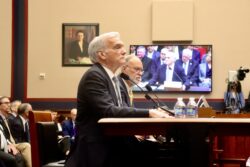Newly elected Georgetown University Student Association senators mapped out potential initiatives for defending students rights, and increasing funding for student clubs, and intiatives at their inaugural GUSA Senate meeting on Sept. 30.
GUSA Senator Josh Mogil (SFS ’11) hopes to restart and head a student advocacy committee. GUSA formed the committee last fall, but it stalled when Mogil left to study abroad in the spring.
According to Mogil, GUSA and the Corp used to publish a pamphlet on students’ rights, but it hasn’t been updated or distributed in years.
Mogil is currently in the process of updating the pamphlet and will soon be seeking input from the Department of Public Safety, the Metropolitan Police Department, lawyers, and other University offices. Ideally, the pamphlet will contain information about students’ rights as D.C. residents and Georgetown students, and advice on how to deal with officers from DPS and MPD.
Mogil also hopes to train a group of volunteers to counsel individual students about their rights in the University’s disciplinary system.
For advice on developing a program, Mogil will speak with the leaders of similar student advocacy programs at American University and George Washington University.
At AU, the student body president appoints the Director of the Student Advocacy Center, which receives funding directly from the University. Aleksandra Kocelko, the current director, said that she and 17 other volunteers advise students when they go through the University’s disciplinary process to make sure they know their rights.
“We talk them through the process, very carefully, step by step,” Kocelko said.
In addition to advising students, AU’s Student Advocacy Center also has a policy committee that works with the university to make additions and modifications to the Student Code of Conduct. Kocelko herself meets weekly with the Director of Student Conduct and Conflict Resolution Services to discuss any major issues.
As student-neighbor relations rise to their most contentious level in years, Mogil said, an advocacy committee, may prove especially helpful.
“The police and our neighbors seem to have taken a great interest in making our lives more difficult, so we should fight back intellectually,” Mogil said.
Another major project for GUSA this year will be changing the way they use the Student Activities Fee, the $100 fee that all undergraduates pay at the start of every academic year. Currently, GUSA distributes half of the money collected to student clubs through Advisory Boards like Club Sports and the Student Activities Commission, while the other half is invested in an endowment. The endowment was started in 2001 and was supposed to have accrued enough interest by now to be self-sustaining.
According to Senator Colton Malkerson (COL ’13), a poor economy and poor management of the larger University endowment have kept the invested dollars from appreciating to a sufficient level. Malkerson said that GUSA will not release an official plan until Senate committees are formed, but that going forward, senators will probably scale back deposits into the endowment and allocate more to campus groups.
“At the end of the day there will be substantially more money [for GUSA] to allocate,” Malkerson said.
Any change in the way the fee is handled will require approval in a referendum by the student body, Malkerson said. GUSA would hold two town hall meetings before any referendum to discuss the issue with students. Though the University has no official say in the matter, Malkerson said it was very supportive of changing the fee.
GUSA will also debate what to do with $1.9 million dollars remaining in the endowment and whether or not they want to increase the fee to keep pace with inflation.
“Everything is on the table,” he said.
GUSA will also be looking to redirect expenditures in its funding of the weekend GUTS buses. Currently, GUSA uses money from the Student Activities Fee to help fund weekend GUTS buses. The University only contributes to weekday GUTS bus service.
“I think that should be a University expenditure,” said GUSA President Calen Angert (MSB ’11). “We’re going to find a way to make sure [the University funds the buses].”





GUSA shouldn’t be funding the weekend bus service, especially when OTM and the Hospital both advertise it on their website as if it were a service they provide, with no credit to the student association.
Also, endowment reform is great, but the ultimate change would be the gutting of the Access to Benefits policy.